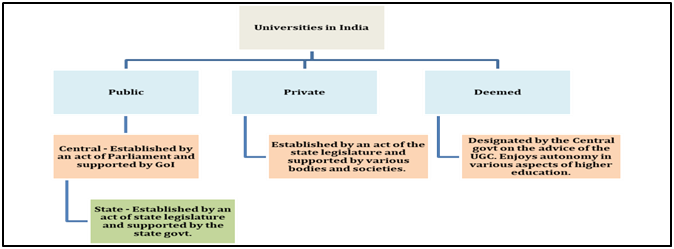Why in news?
- Union Education Minister has released the UGC (Institutions Deemed to be Universities) Regulations, 2023, which will replace the 2019 guidelines.
- The revised guidelines have simplified the eligibility criteria in order to establish more quality-focused deemed universities.
What’s in today’s article?
- University Grants Commission (UGC)
- Deemed Universities
- News Summary
The University Grants Commission (UGC):
- The UGC was established as a statutory body in November 1956 by the UGC Act 1956.
- It is set up by the Ministry of Education’s Department of Higher Education.
- A proposal to replace it with another new regulatory body called the Higher Education Commission of India (HECI) is under consideration by the Government of India.
Mandate:
- The UGC has the unique distinction of being the only grant-giving agency in the country which has been vested with two responsibilities of:
- Providing funds
- Coordination, determination and maintenance of standards in institutions of higher education.
- The UGC`s mandate includes:
- Promoting and coordinating university education.
- Determining and maintaining standards of teaching, examination and research in universities.
- Framing regulations on minimum standards of education.
- Advising the Central and State governments on the measures necessary for improvement of university education, etc.
Deemed Universities
- The term deemed university refers to institutions of higher education that have been granted the status of a university by the Department of Higher Education, Ministry of Education.
- Deemed universities are autonomous institutions that have the authority to award degrees and diplomas in their own name.
- There are around 170 deemed institutions in the country currently.
- They enjoy certain privileges and have the freedom to design their own curriculum, conduct admissions, and set their own academic standards.
- The status of a deemed university is granted to an institution based on its overall academic excellence, research contributions, and infrastructure.
- Typically, these institutions focus on specific areas of study such as engineering, medicine, management, arts, and sciences.
- These universities are subject to periodic reviews by the University Grants Commission (UGC) to ensure compliance with regulations.
News Summary: New guidelines for granting deemed university status
Background:
- The UGC Act provides for the central government to declare any institution other than a university the status of institution deemed to be university.
- The first set of regulations in this regard was notified in 2010 and these were subsequently revised in 2016 and 2019.
New Guidelines
- Framed on the principle of a “light but tight”
- The new rules are built on the principle of a “light but tight” regulatory framework envisioned in the National Education Policy 2020.
- Changed criteria
- Under the 2019 guidelines, the higher education institutions having existence for not less than 20 years were eligible for applying for the status.
- In the revised guidelines, it has been replaced with:
- multi-disciplinarity,
- NAAC grading,
- NIRF ranking and
- NBA grading.
- It means any multi-disciplinary institution will be able to apply for the deemed status if they have:
- valid accreditation by NAAC with at least 3.01 cumulative grade point average (CGPA) for three consecutive cycles,
- NBA accreditation for two-thirds of eligible programmes for three consecutive cycles or
- in the top 50 of any specific categories of NIRF for the last three years continuously.
- Hence, higher education institutions which are less than 20 years old will now be eligible to apply for deemed university status, provided they fulfil the above criteria.
- A cluster of institutions managed by more than one sponsoring body or a society can also apply for deemed to be university status.
- Deemed status under the Distinct Institution category
- The new regulation also introduces the “Distinct Institution” category.
- However, to get recognition under this category, the applicants must establish (to the satisfaction of the Expert Committee of Commission) that the institution is engaged in:
- teaching and research in unique disciplines and/or
- addressing the strategic needs of the country or
- the preservation of Indian cultural heritage or preservation of the environment or
- skill development or dedicated to sports or languages or any other discipline.
- Criteria to set up off-campus centres
- Deemed universities with minimum ‘A’ grade and above or ranked from 1 to 100 in the universities category of NIRF rankings of the relevant year are eligible to set up off-campus centres.
- Institutions declared as deemed to be university under a distinct category can apply for off-campus after five years of their declaration if they are accredited with an A grade or figured in the top 100 in the ‘universities’ category of NIRF.
- Other criteria
- Among other criteria that have been changed are:
- the faculty strength has been increased from 100 to 150,
- corpus fund for private institutions has been increased from Rs 10 crore to Rs 25 crore, and
- creation of an executive councils like central universities in these universities as well.
- Deemed universities must register on Academic Bank of Credits (ABC).
- ABC is a virtual/digital storehouse that contains the information of the credits earned by individual students throughout their learning journey.
- Among other criteria that have been changed are:





